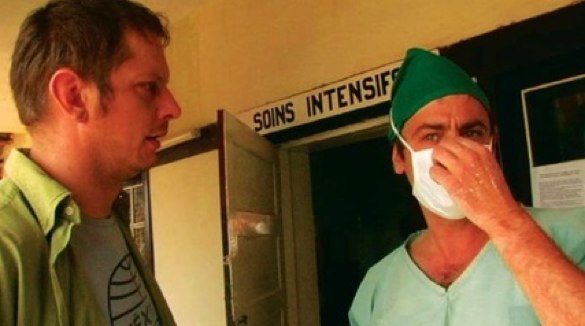Moment of Truth: Living in Emergency Gets Real With Doctors Without Borders
And the flipside, Mark, has you not wanting to interfere with doctors doing such serious work -- even while you have a pretty specific responsibility to depict this authentically. How did you find the balance?
MH: It's extremely uncomfortable, obviously. Especially when you're trying to talk to people at times that you know are extremely difficult for them. You weigh out situations all the time, but you're there to try and make the best film possible. It's not an easy position to be in. And also, they're great people; you don't want to have to push them on certain things that are sensitive or whatever. But you feel sometimes that you need to because it serves the story.
Was there a trust-building process for the doctors and hospitals? Did you let Mark get started straightaway, or kind of have to work one stage at a time?
CL: I think the slowness of it was before the crew came to the field. I think for us it was just trusting the choice that MSF made in general. Once they were there, there was no choice any more to trust them or not.
It's also pretty graphic in parts. What was your decision-making process in terms of what you wanted to show -- or even what you could show?
MH: It's remarkably not graphic in relation to what we actually saw. We put enough of it in the film to show people what it's like -- what the doctors are experiencing. It's a small number of minutes once you add it up over the body of the film, but I think because it's actually real -- it's happening to real people -- it's quite impactful. But we thought it was necessary to show for people to understand the environment.
We've all seen M*A*S*H, obviously, and this has some of that flavor and texture. But as docs go, what were some of the more influential for what you were doing here?
MH: Not really. M*A*S*H was a film we all watched and thought it captured the right frequency form the dramatic sense. These doctors who work and play in these environments was something where we thought, "There's got to be a real version of that" -- which is what you're looking at from the field.
Chiara, you totally rock in this film. You've got a great attitude, you look great, and you've just got such tremendous confidence. Considering the direness of these first missions, how did you get to the point where we find you in Living in Emergency?
CL: That's just how I look when I'm desperate. [Laughs] I didn't get whatever I wanted, for sure. I was far from there. There is a [point] where you realize that somehow the level of responsibility you have is toward the people you're working with. And therefore, the least I could do was to stay calm when they were losing it.
*This interview is an edited version of an AppleTalk conversation held May 24 in New York.
Pages: 1 2

